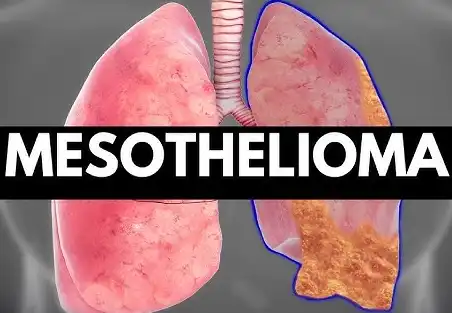
What is Mesothelioma?
Mesothelioma is a rare type of cancer that develops in the mesothelium, the protective lining covering internal organs like the lungs, abdomen, and heart. The disease is primarily linked to asbestos exposure, which triggers abnormal cell growth over decades. Symptoms often appear late, making early detection difficult. While mesothelioma is aggressive and challenging to cure, early diagnosis and modern treatments such as surgery, chemotherapy, and immunotherapy can improve survival and quality of life. Understanding its causes, symptoms, and risk factors is crucial for prevention and timely medical attention.

What are the symptoms of Mesothelioma?
Mesothelioma symptoms depend on the type and affected area. Common signs include persistent cough, chest pain, shortness of breath, and fatigue for pleural mesothelioma. Peritoneal mesothelioma can cause abdominal swelling, pain, nausea, and weight loss. Less common types, such as pericardial or testicular mesothelioma, may present with heart rhythm issues or scrotal swelling. Symptoms often develop gradually and may resemble other conditions, making diagnosis difficult. Monitoring health after asbestos exposure and seeking medical evaluation for persistent symptoms is critical. Early detection allows for more treatment options and can improve prognosis.
What causes Mesothelioma?
Mesothelioma is primarily caused by exposure to asbestos fibers, which were widely used in construction, insulation, and manufacturing. Inhaling or ingesting these microscopic fibers can cause chronic inflammation and genetic damage in mesothelial cells over decades. Other potential factors incMude genetic predisposition, radiation exposure, or rare mineral fibers similar to asbestos. Although not everyone exposed develops mesothelioma, repeated or heavy exposure significantly increases risk. The disease’s long latency period, often 20–50 years, means symptoms appear much later, making early detection difficult. Awareness of exposure history is vital for prevention and monitoring.
What are the types of Mesothelioma?
Mesothelioma is categorized based on the area of the body it affects.
- Pleural Mesothelioma:
- Develops in the lining of the lungs (pleura).
- Most common type of mesothelioma.
- Peritoneal Mesothelioma:
- Affects the lining of the abdomen (peritoneum).
- Causes swelling and digestive problems.
- Pericardial Mesothelioma:
- Occurs in the lining around the heart (pericardium).
- Rare and challenging to treat.
- Testicular Mesothelioma:
- Develops in the lining around the testes.
- Extremely uncommon.
- Key Points:
- Each type shows different symptoms and treatment challenges.
- Identifying the specific type is crucial for choosing the right therapy.
- Some types respond better to surgery or systemic treatments, improving prognosis.
Who is at risk for Mesothelioma?
Individuals with occupational or environmental exposure to asbestos are at the highest risk for mesothelioma. This includes construction workers, shipyard employees, miners, mechanics, and factory workers handling asbestos materials. Family members may also face secondary exposure from asbestos dust carried home on clothing. Age and gender can influence risk, as most cases occur in older men with long-term exposure. Smoking doesn’t directly cause mesothelioma but can worsen lung health. Awareness of workplace safety, protective equipment, and regular health screenings can reduce risk and help in early detection.
How is mesothelioma diagnosed?
Mesothelioma diagnosis begins with reviewing medical history and potential asbestos exposure. Imaging tests like X-rays, CT scans, or MRIs help identify abnormal growths in the lungs, abdomen, or heart lining. Blood tests can detect biomarkers associated with the disease. A definitive diagnosis requires a biopsy, where tissue is collected and examined under a microscope for cancer cells. Additional tests like PET scans may assess cancer spread. Early diagnosis is challenging but essential for effective treatment planning. Combining medical history, imaging, and pathology ensures accurate identification of mesothelioma type and stage.
How is mesothelioma diagnosed early?
Early mesothelioma diagnosis relies on recognizing risk factors, like asbestos exposure, and monitoring subtle symptoms such as persistent cough, chest discomfort, or abdominal swelling. Imaging tests, including X-rays, CT scans, and MRIs, help detect abnormal growths. Biomarker blood tests and tissue biopsies confirm the diagnosis. Regular check-ups for at-risk individuals improve the chances of early detection. Awareness of family or occupational exposure, combined with timely evaluation of symptoms, allows doctors to initiate treatment sooner, improving outcomes. Early diagnosis is critical because treatment is more effective before tumors spread extensively.
How fast does mesothelioma grow?
Mesothelioma growth varies depending on its type and individual factors. Pleural mesothelioma often spreads along the lung lining gradually, while peritoneal mesothelioma can expand more quickly in the abdominal cavity. The disease’s progression is influenced by tumor aggressiveness, immune response, and overall health. Symptoms may appear late because tumors initially grow slowly, making early detection difficult. Without treatment, mesothelioma can spread to nearby organs and lymph nodes. Monitoring exposure history, regular imaging, and prompt medical attention for new symptoms are critical for controlling growth and improving survival outcomes.
How common is mesothelioma in women?
Mesothelioma is less common in women than men, primarily because men historically had more occupational asbestos exposure. Women account for roughly 20–25% of all cases. Female patients may develop mesothelioma through environmental or secondary exposure, such as living with asbestos-exposed family members. Symptoms and treatment are similar to men, but awareness is important since delayed diagnosis can worsen outcomes. Regular monitoring of at-risk women and timely evaluation of respiratory or abdominal symptoms can improve early detection and treatment success.
What symptoms indicate advanced mesothelioma?
Advanced mesothelioma often presents with worsening symptoms. These may include severe chest or abdominal pain, persistent coughing, shortness of breath, fluid buildup, significant fatigue, and unexplained weight loss. Patients may experience difficulty swallowing, digestive issues, or swelling in the abdomen or legs. Advanced disease can also lead to organ dysfunction, including compromised lung or heart function. Symptoms gradually intensify as tumors spread to nearby organs or lymph nodes. Early recognition of these warning signs allows healthcare providers to implement palliative care, symptom management, and specialized treatments to maintain comfort and quality of life.
Homeopathic Treatment for Mesothelioma
Mesothelioma is a serious cancer affecting the mesothelial lining, usually caused by asbestos exposure. While conventional treatments like surgery, chemotherapy, and radiation are standard for controlling tumor growth, homeopathy can play a supportive role in improving quality of life and reducing symptoms.
Homeopathic remedies aim to:
- Boost the immune system and natural healing capacity.
- Reduce pain, inflammation, and fluid accumulation.
- Support energy levels and overall well-being.
- Manage side effects of conventional treatments like nausea, fatigue, or weakness.
Commonly selected remedies are individualized based on the patient’s physical, emotional, and mental state. Some may help with respiratory distress, others with abdominal swelling or fatigue. Homeopathy works best when tailored by a qualified practitioner, in coordination with conventional therapy, ensuring complementary care rather than a replacement for medical treatment.
Why choose Dr. Sanjay’s Homoeopathy for Mesothelioma treatment in Lucknow, India?
Dr. Sanjay’s Homoeopathy is a trusted name for safe and supportive mesothelioma treatment in Lucknow, India. With years of expertise, Dr. Sanjay provides specialized mesothelioma homeopathic treatment in Lucknow, India, that helps manage symptoms like chest pain, breathlessness, fatigue, and cough naturally without harmful side effects. As a leading homeopathic doctor in Lucknow, he follows international treatment standards and offers personalized care aimed at improving quality of life, boosting immunity, and supporting overall well-being. Patients choose Dr. Sanjay’s Homoeopathy for its holistic healing, compassionate care, and integrative approach in managing complex conditions like mesothelioma.


